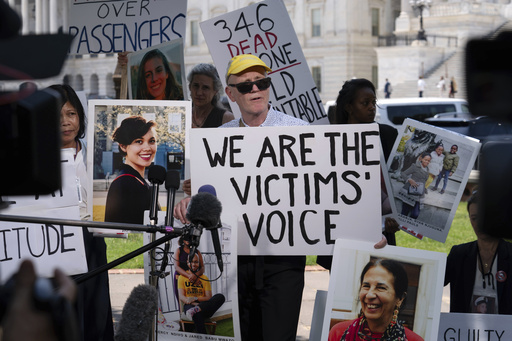FORT WORTH, Texas — On Friday, family members of those who perished in two tragic crashes involving Boeing 737 Max aircraft gathered in a Texas federal court. They were present as their legal representatives urged the presiding judge to reject a plea agreement that Boeing had negotiated with federal prosecutors and to instead move forward with a trial against the company.
The attorneys argued that the punishment proposed for Boeing, primarily a fine of around $244 million, is excessively lenient considering the serious misrepresentation of a malfunctioning flight-control system to regulators prior to the incidents. The lawyers contended that both Boeing and the Justice Department were downplaying critical information, particularly the fact that 346 lives were lost in the crashes.
U.S. District Judge Reed O’Connor pressed a Boeing attorney to explain why he should accept the prearranged plea deal and a sentence formulated by the defendant itself. Boeing’s attorney, Ben Hatch, defended the agreement by stating that Boeing plays a vital role in the national economy and defense sector, asserting that the company needs clarity on the penalties it faces before entering a guilty plea for conspiracy to commit fraud, a serious felony charge. He expressed concerns that uncertainty surrounding sentencing could jeopardize the workforce and shareholders.
The attorney’s remarks shocked and infuriated the victims’ families. Michael Stumo, whose daughter Samya lost her life in the second crash, expressed his outrage following the hearing. “Boeing is being treated as if it’s essential to the economy—too big to jail. That’s essentially what he’s suggesting,” Stumo remarked, arguing that this perception allows massive corporate entities to evade consequences for their actions, irrespective of the loss of life involved.
The government supported Boeing’s request for the judge to accept the deal made earlier in July. Sean Tonolli, the senior deputy chief in the Justice Department’s fraud section, explained that the conspiracy charge is the gravest offense they could pursue, as they lack evidence to conclusively show that Boeing’s deceptive practices directly led to the crashes. He noted the inherent risks of taking the case to trial despite confidence in their position.
Judge O’Connor, who received written submissions from both sides prior to the hearing, engaged in discussions but refrained from indicating his inclination one way or another. He has previously acknowledged the families’ suffering in earlier rulings, describing Boeing’s actions as “egregious criminal conduct” in a ruling made in 2023.
During the previous month, Boeing had consented to plead guilty to a single felony count of conspiracy to commit fraud, linked to misleading the Federal Aviation Administration (FAA) regarding pilot training requirements for the 737 Max. The FAA had approved minimal, computer-based training for pilots, benefiting Boeing as it eliminated the need for costly simulator training for airlines operating the Max. The model began flying in 2017, with an inaugural crash occurring in Indonesia in October 2018, followed by another tragedy in Ethiopia in March 2019.
As part of the plea agreement, which dictates that Boeing could face a maximum fine of $487.2 million, the fine would be reduced by $243.6 million credited from a prior settlement of $2.5 billion that Boeing paid in 2021 to avert prosecution. In May, the Justice Department determined that Boeing had breached the terms of this earlier settlement, which prompted the new plea agreement.
Boeing, headquartered in Arlington, Virginia, is also expected to allocate $455 million towards compliance measures and safety initiatives alongside a three-year probation period.
The situation is further complicated by ongoing challenges for Boeing, including a recent breakdown in negotiations with factory workers who produce some of the company’s most popular aircraft. The withdrawal of their offer has led S&P Global Ratings to place Boeing on its credit watch list, underscoring rising financial risks amid labor disputes. Additionally, Boeing has filed a complaint with the National Labor Relations Board, accusing the International Association of Machinists and Aerospace Workers of unfair labor practices and claiming that the union’s public portrayal has hindered reaching an agreement.



